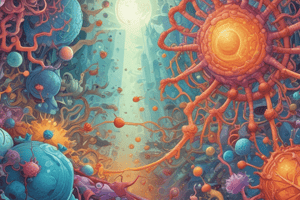Podcast
Questions and Answers
The ability of a specific immune cell to proliferate and form many generations of nearly identical cells is called __________.
The ability of a specific immune cell to proliferate and form many generations of nearly identical cells is called __________.
clonality
The characteristic of adaptive immunity by which the adaptive immune response acts against one molecular shape and no others is called __________.
The characteristic of adaptive immunity by which the adaptive immune response acts against one molecular shape and no others is called __________.
specificity
Which of the following statements regarding the lymphatic system is FALSE?
Which of the following statements regarding the lymphatic system is FALSE?
- Lymphatic vessels drain excess fluids from tissues.
- Lymphatic fluid is moved by contraction of lymphatic vessels. (correct)
- Lymphatic system is part of the circulatory system.
- Lymphatic vessels transport immune cells.
Which of the following is NOT included in the MALT?
Which of the following is NOT included in the MALT?
The majority of T cells that leave the thymus will have which of the following characteristics?
The majority of T cells that leave the thymus will have which of the following characteristics?
Which of the following is a component of a B cell receptor but NOT a T cell receptor?
Which of the following is a component of a B cell receptor but NOT a T cell receptor?
An adaptive immune response to the protozoan that causes malaria is problematic because
An adaptive immune response to the protozoan that causes malaria is problematic because
Which of the following is the most variable region of an antibody molecule?
Which of the following is the most variable region of an antibody molecule?
Class I MHC molecules are essential for?
Class I MHC molecules are essential for?
Class II MHC are found on?
Class II MHC are found on?
Exogenous antigens are processed for immune recognition by ________ cells.
Exogenous antigens are processed for immune recognition by ________ cells.
What is the result when a dendritic cell phagocytizes a microbe and processes it?
What is the result when a dendritic cell phagocytizes a microbe and processes it?
Clonal deletion of developing T lymphocytes takes place in which location(s) in the body?
Clonal deletion of developing T lymphocytes takes place in which location(s) in the body?
A single B lymphocyte can recognize multiple antigenic determinants.
A single B lymphocyte can recognize multiple antigenic determinants.
The antibody-binding site of an antibody is made up of?
The antibody-binding site of an antibody is made up of?
Which of the following does NOT contain MHC II on its surface?
Which of the following does NOT contain MHC II on its surface?
The type of immunoglobulin illustrated in the figure is (17)
The type of immunoglobulin illustrated in the figure is (17)
Which of the following statements regarding antibody function is FALSE?
Which of the following statements regarding antibody function is FALSE?
The most prevalent type of antibody in the blood is?
The most prevalent type of antibody in the blood is?
Which of the following best describes IgM antibodies?
Which of the following best describes IgM antibodies?
Immature B lymphocytes undergo clonal deletion in the bone marrow.
Immature B lymphocytes undergo clonal deletion in the bone marrow.
Which of the following statements concerning plasma cells is FALSE?
Which of the following statements concerning plasma cells is FALSE?
Enhanced immune responses to subsequent exposures to an antigen to which the body has already been exposed are known as ________ responses.
Enhanced immune responses to subsequent exposures to an antigen to which the body has already been exposed are known as ________ responses.
Which structure do antigen presenting cells utilize to directly help them present bacterial antigens?
Which structure do antigen presenting cells utilize to directly help them present bacterial antigens?
Which of the following are likely to be found on an MHC-I protein?
Which of the following are likely to be found on an MHC-I protein?
What would a virally infected skin epithelial cell have on its cell surface?
What would a virally infected skin epithelial cell have on its cell surface?
Which of the following would you likely see on the surface of a human dendritic cell following phagocytosis of a bacterium?
Which of the following would you likely see on the surface of a human dendritic cell following phagocytosis of a bacterium?
Tom has a genetic disorder in which he does not synthesize class I MHC proteins or functional NK cells. Which of the following statements would be true for Tom?
Tom has a genetic disorder in which he does not synthesize class I MHC proteins or functional NK cells. Which of the following statements would be true for Tom?
Antigen processing and presentation?
Antigen processing and presentation?
Why would a body cell that is not a phagocyte need to present antigens?
Why would a body cell that is not a phagocyte need to present antigens?
Study Notes
Clonality and Specificity
- Clonality refers to the ability of specific immune cells to proliferate, creating many identical cells.
- Specificity in adaptive immunity means responses are targeted against particular molecular shapes.
Lymphatic System and MALT
- Lymphatic vessels do not contract; they rely on external forces to move lymphatic fluid.
- The spleen is not part of Mucosa-Associated Lymphoid Tissue (MALT).
T Cells and B Cell Receptors
- Most T cells exiting the thymus recognize Major Histocompatibility Complex (MHC) and do not react to autoantigens.
- Light chains are unique components of B cell receptors, absent in T cell receptors.
Malaria and Immune Response
- The malaria-causing protozoan infects red blood cells (RBCs). RBCs lack MHC, making adaptive immune responses difficult as they cannot present antigens.
Antibody Structure
- The Fab region is the most variable part of an antibody molecule.
- Class I MHC molecules present endogenous antigens, while Class II MHC molecules are found on professional antigen-presenting cells.
Antigen Processing
- Exogenous antigens are recognized by dendritic cells and macrophages.
- Dendritic cells display microbial epitopes as MHC II complexes after processing pathogens.
T Lymphocyte Development
- Clonal deletion of developing T lymphocytes occurs in the thymus.
- A single B lymphocyte is limited to recognizing one specific antigenic determinant.
Antibody Function and Types
- Antibodies bind using the variable regions of both light and heavy chains.
- Red blood cells do not express MHC II on their surface.
- IgG is the most abundant antibody type in blood, while IgM predominates during the initial immune response.
Memory Responses and Plasma Cells
- Memory responses enhance immunity upon re-exposure to previously encountered antigens.
- Plasma cells do not persist as long-term memory cells.
Antigen Presentation Mechanisms
- Phagolysosomes aid antigen-presenting cells in displaying bacterial antigens.
- MHC-I proteins can carry damaged mitochondrial fragments as part of their function.
Implications of Class I MHC Deficiency
- A person lacking class I MHC proteins and functional natural killer (NK) cells would struggle to destroy virally infected cells.
Importance of Antigen Presentation
- Non-phagocytic cells present antigens to inform the immune system about their activities and any potential infections.
Studying That Suits You
Use AI to generate personalized quizzes and flashcards to suit your learning preferences.
Description
Test your knowledge on immunology concepts such as clonality and specificity with these flashcards. This quiz covers essential terms and characteristics related to the adaptive immune response. Perfect for students looking to reinforce their understanding of immunology.



